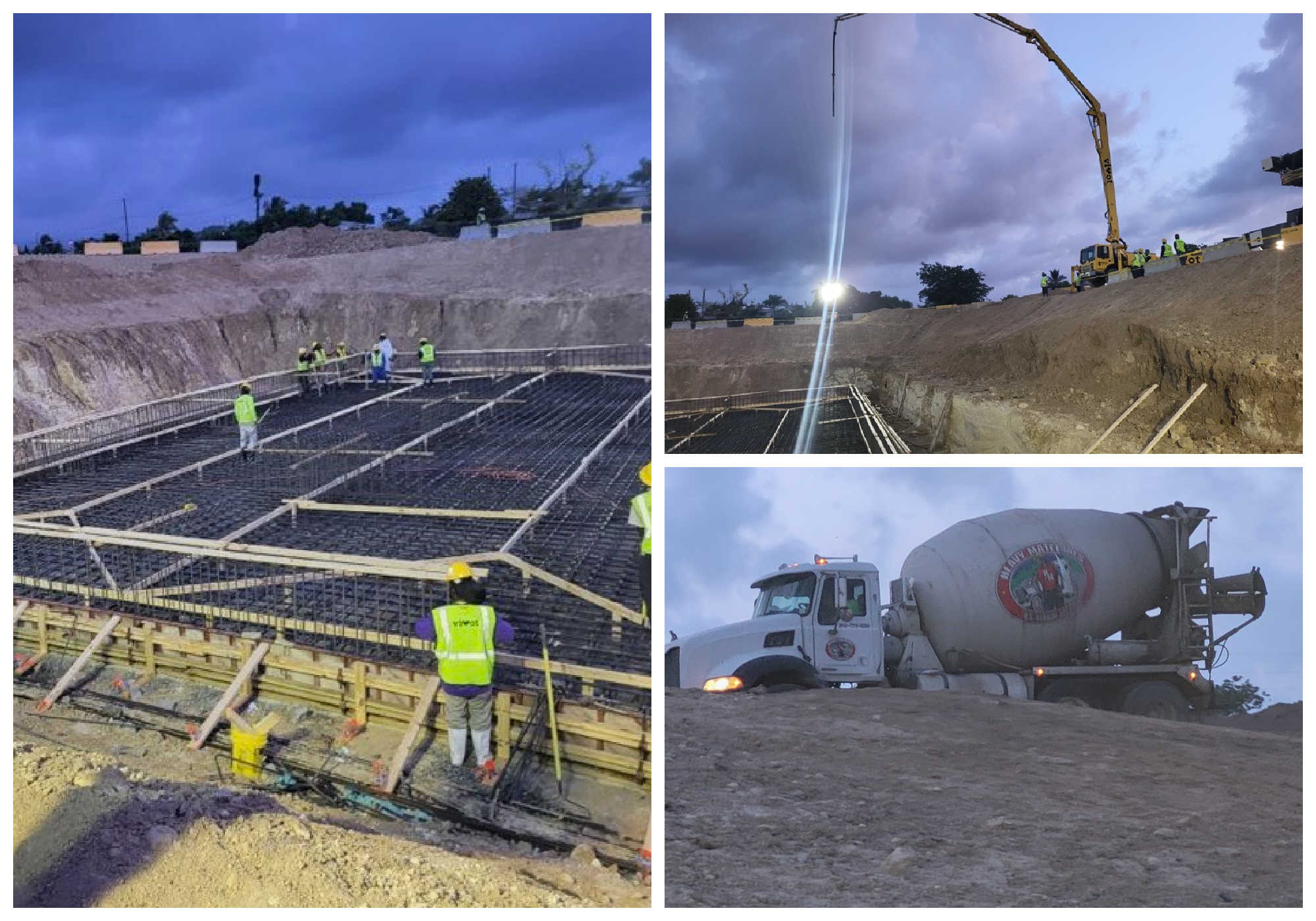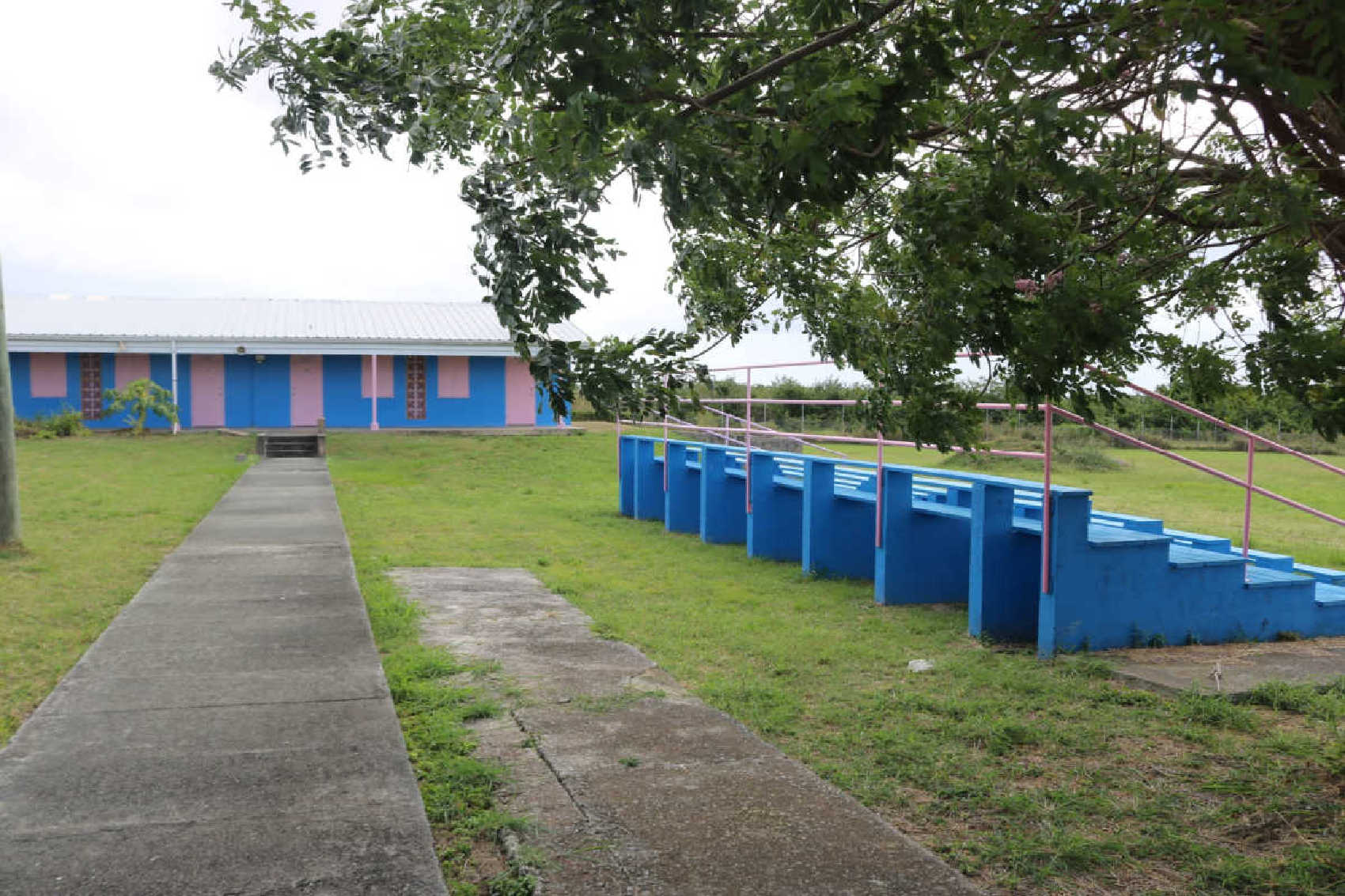Disaster Recovery
Significant Progress at Arthur A. Richards PreK-8: First Concrete Layer Sets Stage

The Virgin Islands Department of Education celebrated a remarkable milestone at the Arthur A. Richards PreK-8 School construction site this Wednesday. Commissioner Dionne Wells-Hedrington of the Department of Education (D.O.E.) jubilantly confirmed the commencement of the first concrete pour, marking a vital advancement in this iconic venture.
Recalling the inaugural ceremony earlier this year on February 23rd, Commissioner Wells-Hedrington remarked, “Today’s foundational concrete layer symbolizes a considerable stride in the project. The fact that we’re establishing a fresh school in St. Croix District after so many years makes this achievement all the more special.”
Extending her heartfelt appreciation, the Commissioner applauded the concerted endeavors of every stakeholder in the initiative. “It’s long overdue that our students are gifted with state-of-the-art educational infrastructures,” she emphasized. This remarkable endeavor witnessed the collaborative efforts of many, notably the New Schools Construction Advisory Board, MCN Build, the DLR Group, Witt O’Brien’s, the Office of Disaster Recovery, FEMA, VITEMA, VIHFA, the Department of Public Works, and several diligent members from the Department of Education, including the esteemed Architect Chaneel Callwood-Daniels.
Tracing back to 2017, the former Arthur A. Richards Jr. High School faced extensive damage due to the ravaging impact of Hurricanes Irma and Maria, which led to its eventual demolition. As a testament to resilience and advancement, the newly envisioned school comes with a whopping budget of $163 million and is spread across an expansive 145,000 sq. ft., occupying the previous premises of Evelyn M. Williams Elementary School.
Commissioner Wells-Hedrington further shed light on the holistic vision behind this endeavor. “It’s more than just a rebuild. We’re paving the way for a transformative educational journey, understanding the deep impact a conducive environment has on molding our future torchbearers,” she articulated. “With this, we’re redefining the benchmarks for 21st-century educational spaces in the U.S. Virgin Islands.”
MCN Build, the principal design-build contractor, recently unveiled the school’s progressive blueprint, set to be rolled out in three distinct phases:
- Phase 1: Encompasses the Utility building, a multipurpose gym, a dedicated PreK section, and a common gathering space.
- Phase 2: Focuses on two primary education structures, K-5 Building A & B, accompanied by the central Administrative unit.
- Phase 3: Wrapping up the project, this phase will see the 6-8 middle school edifice, extensive landscaping, hard landscaping, and an all-inclusive field.
In a bid to ensure sustainability, the school is slated to house a subterranean cistern with a massive 250,000-gallon capacity, bolstered by protective retaining walls towards the property’s west and northwest perimeters. The next pivotal step on the horizon? Setting the groundwork for the utility building.
Disaster Recovery
Major Boost for USVI: Bryan Announces Up to $600 Million in FEMA Funding for Power Plant Replacement

In a significant development for the U.S. Virgin Islands, Governor Albert Bryan Jr. announced on Wednesday that the Federal Emergency Management Agency (FEMA) will fund the comprehensive replacement of the V.I. Water and Power Authority’s (WAPA) Estate Richmond Power Plant on St. Croix and upgrade several units on St. Thomas.
Governor Bryan revealed that the news came during a Monday call with FEMA, offering a much-needed boost for WAPA, which has been grappling with grid failures, power rotations, damaged equipment, adverse weather, and low fuel inventory.
“We are already well on the way to fixing the St. Thomas plant,” Bryan stated. “With this new addition, we can replace older and damaged units on St. Croix, significantly improving reliability and affordability by using more efficient units.”
Adrienne Williams-Octalien, director of the Office of Disaster Recovery, emphasized the benefits of an updated power plant, including better interconnections for renewable energy. She highlighted that the approval followed a joint request by ODR and WAPA to FEMA four years ago. This request covered the St. Croix power plant and multiple generators at the Randolph Harley plant on St. Thomas.
With FEMA’s approval, the agencies will start drafting solicitations and securing contracts promptly. The project costs, estimated between $400 million and $600 million, must be validated through FEMA’s costing center before funds are obligated. Williams-Octalien noted the importance of completing this by September to leverage the current relaxed matching funds requirements for local government. “We want to ensure that we get this project started within the next 12 months,” she said.
Despite the positive news, WAPA’s ability to manage this significant funding amid its financial and management crises remains a concern. Governor Bryan stressed the need for the agency’s staff and management to focus on ongoing projects, such as solar and wind farms, undersea cable repairs to St. John, and building redundancies in the power supply. He suggested incorporating the St. Croix power plant rebuild into the territory’s broader recovery efforts, as part of the billion-dollar Rebuild VI project packages designated for major contractors.
Kyle Fleming, chair of WAPA’s governing board, acknowledged that this funding is not a panacea for all of WAPA’s issues, including delays in crucial projects. However, he praised the Incident Command Team for making significant progress in addressing these challenges. “It really is a divide and conquer mentality,” Fleming said, noting that the incident command structure has improved team collaboration and focus.
As officials work to ensure the successful replacement of the Estate Richmond power plant on St. Croix, Governor Bryan has pledged unwavering support for WAPA’s efforts to achieve sustainable operations and a brighter energy future for the territory. “We got to do what we got to do to keep the power on,” he declared.
Disaster Recovery
Lawmakers Question Resilience of School Rebuilds Amid Stronger Storms and Rising Temperatures

Warmer global temperatures are presenting unprecedented challenges for the Caribbean, with islands facing more frequent and intense storms, hurricanes, and heat waves. These impacts are acutely felt in the U.S. Virgin Islands (USVI), where the territory is still grappling with the aftermath of Hurricanes Irma and Maria seven years on.
The V.I. Department of Education estimates it will take another seven to ten years to fully rehabilitate and rebuild schools across both districts. However, concerns have been raised about whether these new designs are adequately hurricane-resilient. This issue was highlighted by Senator Franklin Johnson during a recent Committee of Disaster Recovery, Infrastructure, and Planning meeting.
Senator Johnson questioned Education Commissioner Dionne Wells-Hedrington about the design choices, particularly the use of overhangs. “I’m not a builder, but I watch a lot of the drawings and I see a lot of hangovers,” Johnson remarked. He referred to past practices, such as removing overhangs to strengthen homes before Hurricane Hugo in 1989, and suggested that fewer overhangs might result in more secure roofs.
Chaneel Callwood, the department’s architect, explained that school principals requested overhangs to protect students from rain and sun while moving around the campus. To address the senator’s concerns, Ms. Callwood assured that the overhangs would be fortified with additional steel to withstand storms. She also noted that these plans have been approved by the Federal Emergency Management Agency (FEMA) and comply with hurricane codes, given that the USVI is in the “highest wind category.”
In addition to storm resilience, rising temperatures pose another significant challenge. In 2023, the Department of Education shortened school hours due to a severe heatwave, which led to student protests and a response from the governor. With fears of a repeat in 2024, Senator Novelle Francis inquired about the preparations being made.
Commissioner Wells-Hedrington highlighted the Eulalie Rivera K-8 school as particularly affected in the St. Croix district, with electrical upgrade plans already in the solicitation phase and air conditioning equipment available on the island. “It’s just a matter of all those things being taken care of so that the installation can be effective,” she said.
Other schools are also under consideration for air conditioning repairs and maintenance during the summer. However, the St. Croix Educational Complex lacks the infrastructure to support these upgrades. Consequently, the complex will not receive air conditioning units for the entire campus in the new school year. The commissioner emphasized that this school would be a central focus for the department as it continues to navigate funding constraints and deadlines in its ongoing school repair and replacement efforts.
Disaster Recovery
$384 Million FEMA Grant Boosts USVI School Rebuilding Efforts

The U.S. Virgin Islands will benefit from a significant federal boost, receiving $384.8 million from the Federal Emergency Management Agency (FEMA) for the demolition and reconstruction of hurricane-impacted schools. This marks a critical step in the territory’s ongoing recovery from the devastating effects of hurricanes Irma and Maria in 2017.
This transformative funding will facilitate the complete reconstruction of three elementary schools on St. Croix and one on St. Thomas, in addition to repairs to a school lunch warehouse on St. Thomas. These efforts are a part of FEMA’s continued partnership with the Virgin Islands government and its Department of Education to provide safe, modern educational environments.
Kristen A. Hodge, Director of FEMA’s Recovery Office in the U.S. Virgin Islands, reaffirmed the agency’s dedication to the territory’s educational future. “I am pleased to approve these latest obligations that help bring the Virgin Islands closer to post-hurricane recovery. Our commitment to the future leaders of the Virgin Islands by providing them safe facilities in which to receive their education remains strong,” she stated.
Project Highlights and Funding Specifics:
- Lew Muckle Elementary School on St. Croix will see prudent reconstruction of seven of its 11 buildings on a 3.94-acre site in Sion Farm.
- Eulalie Rivera Elementary School, also on St. Croix, will undergo the replacement of 12 structures, including classrooms and facilities such as the athletic field bathroom.
- Juanita Gardine Elementary School in Estate Richmond, St. Croix, is set for extensive rebuilding, including its auditorium and several auxiliary buildings.
- On St. Thomas, Leonard Dober Elementary School will have three buildings replaced following severe damage from the 2017 hurricanes.
- Additionally, repairs to a 7,000-square-foot lunch warehouse on St. Thomas will restore essential functionality and design.
Enabled by the Bipartisan Budget Act of 2018, these funds will allow the V.I. Department of Education to not only rebuild but also modernize educational facilities, merging several schools into updated campuses like Alfredo Andrews and Alexander Henderson Schools. Leonard Dober Elementary School will be closed as it is currently not used for instructional purposes.
The Department of Education expressed its appreciation for this federal aid. “These grant awards signify a pivotal moment for education in the Virgin Islands, allowing for the development of much-needed new schools and the modernization of existing facilities with a focus on equity for all students,” it said.
The department also highlighted the comprehensive nature of the funding. “It is essential to recognize that these grants cover more than construction. They extend to land acquisition, project management, demolition, and design,” VIDE noted. This comprehensive approach ensures thorough planning and execution to meet the highest educational standards.
-

 Education1 year ago
Education1 year agoEducation Board Seeks Input on Schools Through Comprehensive Survey
-

 Education2 years ago
Education2 years agoCTE Board Enthusiastic About New Curriculum Standards, Yet Anxious Over Apprenticeship Support
-

 Crime2 years ago
Crime2 years agoRegistered Sex Offender Detained for Illegal Firearm Possession During Annual Surveillance Drive
-

 Development1 year ago
Development1 year agoCosts Surge as Donoe Estates Housing Project Resumes with New Contractor
-

 Videos2 years ago
Videos2 years ago2022 Gubernatorial Election: Voters Speak Out
-

 Crime2 years ago
Crime2 years agoSt. John’s Westin Resort Scene of Armed Robbery, Prompting Heightened Police Vigilance
-

 Videos3 years ago
Videos3 years agoGubernatorial Teams Celebrate St. Croix’s Bull & Bread Day
-

 Videos2 years ago
Videos2 years agoWakanda’s Female Might: A Dive into ‘Black Panther: Wakanda Forever’




